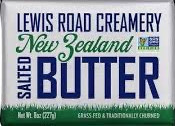About a month ago, while shopping at Central Market North Lamar, I came across a sampling of New Zealand butter from the Lewis Road Creamery. I tasted this creamy (truth in advertising) delicious yellow butter, sending my taste buds into a frenzy. Until Lewis Road, my previous three best-in-class kinds of butter were Kerry Gold (Irish), Plugra (European style), and Amish Country Roll Butter. As a former food critic in Europe for a decade, I’ve tasted my fair share of local butter around the continent, from organic farms in Umbria to small dairies in Normandy to Dutch and Scandinavian creameries, from marigold colored to canary yellow to bright eggshell. Salty and unsalted, whipped and solid.
Lynette Maan discusses owning nine farms in New Zealand with her husband, three other directors, and herself as co-founders and then getting pension funds to back their vision. They purchased the farms ten or so years ago and have invested in improving soils and biodiversity to help climate change mitigation. Lynn and I spoke for a few minutes via FT. She explained, “Previous to when we purchased the farms, the soils were depleted. There was not much bioactivity in them. And if we’re going to change and help climate change, we need the grounds. We need to create solutions.
Lynette Maan discusses, the butter comes from only nine farms, not thousands like many others dairy producers. She, along with her husband and three other directors started the business, purchasing the farms ten years ago. Each is run by a fabulous family who has the ability to buy into the farm. Lynn and I spoke for a few minutes via FT. She explained, the soils were initially depleted and void of life, so we set about farming for good and you can taste it in the butter.
Especially for island nations like New Zealand, global heating, and earth changes affect country, and the indigenous populations more than in other parts of the world. “Yes, that’s why our philosophy is close to our indigenous people, we need to be careful we are not destroying nature when we need it the most. Nature is the most cost effective and long-lasting solution to climate change.
“It’s quite a different attitude than most in the States. We’ve written all sorts of things into our audited certification, called 10 Star Certified Values, meaning high “values” driven. We’ve chosen a humane way to live for all concerned: humans and animals. Our staff on all the farms are paid very well, and perhaps this is why our prices are a bit higher. It’s worth it, though, for quality of life and, of course, taste.”
They have created an audited certification called 10 Star Certified Values.
Above 99% grass fed. No Soyabean, etc.
- 365 days outside on the pasture allow cows to roam on pastures all day and night. The farms are located in places that this can be done.
- High Animal Welfare – Adhering to the five animal freedoms, including freedom from mistreatment and animal welfare.
- GMO-Free and NON-GMO Project Verified
- Climate Change mitigation: low to zero tillage, multi species pastures, dung beetles, etc
- Environmental Sustainability through biodiversity, replanting the land and nurturing, permanent honey hives, the soil, plus much more
- Palm-free feed (the USA organic label does not differentiate between palm-use and palm-free products)
- rBST and growth hormone free
- Antibiotic stewardship
- Human Welfare, on farms, communities, and across the supply chain.
What does antibiotic stewardship mean? I inquired.
“For us, and I don’t know about you, I’ve been on antibiotics a couple of times in my lifetime, and it’s saved my life. We do value a cow’s life. We must weigh a cow’s life versus its suffering, which is hard for a farmer. US Organic farming doesn’t use antibiotics, but then you have the other extreme, where antibiotics are used for everything causing much harm.”
Lewis Road Creamery operates holistically. Rainwater is used, for example, and is plentiful. When a cow is given antibiotics, is it targeted and below the EU-Organic specified amount. In the States, it’s one extreme to another, the highest value practices, or you’re back to industrial factory practices.
I wondered what the carbon footprint was in transporting the butter halfway across the world, but they covered that. “We do not airfreight instead we ship our product over the sea, so our footprint is still lower in totality.”
The butter is sold at Whole Foods nationwide and at select high-end markets. Find them in Austin at Whole Foods and Central Market.
Visit www.lewisroadcreamery.com
IG @lewisroadusa FB @lewisroadusa
